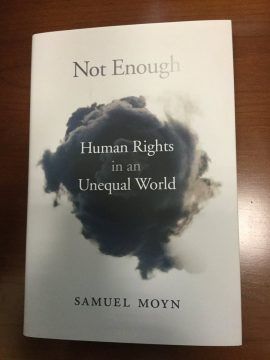Katharine Young in Inference Review:
 In Not Enough, Samuel Moyn addresses a disjunction between the language of human rights and the facts of inequality. Our unequal world, Moyn observes, is one in which the rich have grown ever richer, but the poor have remained poor, or, at best, not quite as poor as they once were. The language of human rights may not have been the cause of economic inequality, he argues, but neither has it done much to prevent it. Moyn, a professor of law and history at Yale University, draws upon a wide range of sources in making his claims: nineteenth-century debates about distributive ethics, eighteenth-century Jacobin texts and treatises, medieval and ancient sources. Moyn also considers more recent events that have long been associated with the history of human rights: Franklin D. Roosevelt’s Second Bill of Rights; the Universal Declaration of Human Rights; and later efforts to emphasize material equality and social justice in the context of decolonization. These efforts, Moyn believes, were too easily assimilated in welfare states, or outpaced in others. They converted none to the cause.
In Not Enough, Samuel Moyn addresses a disjunction between the language of human rights and the facts of inequality. Our unequal world, Moyn observes, is one in which the rich have grown ever richer, but the poor have remained poor, or, at best, not quite as poor as they once were. The language of human rights may not have been the cause of economic inequality, he argues, but neither has it done much to prevent it. Moyn, a professor of law and history at Yale University, draws upon a wide range of sources in making his claims: nineteenth-century debates about distributive ethics, eighteenth-century Jacobin texts and treatises, medieval and ancient sources. Moyn also considers more recent events that have long been associated with the history of human rights: Franklin D. Roosevelt’s Second Bill of Rights; the Universal Declaration of Human Rights; and later efforts to emphasize material equality and social justice in the context of decolonization. These efforts, Moyn believes, were too easily assimilated in welfare states, or outpaced in others. They converted none to the cause.
More here.
